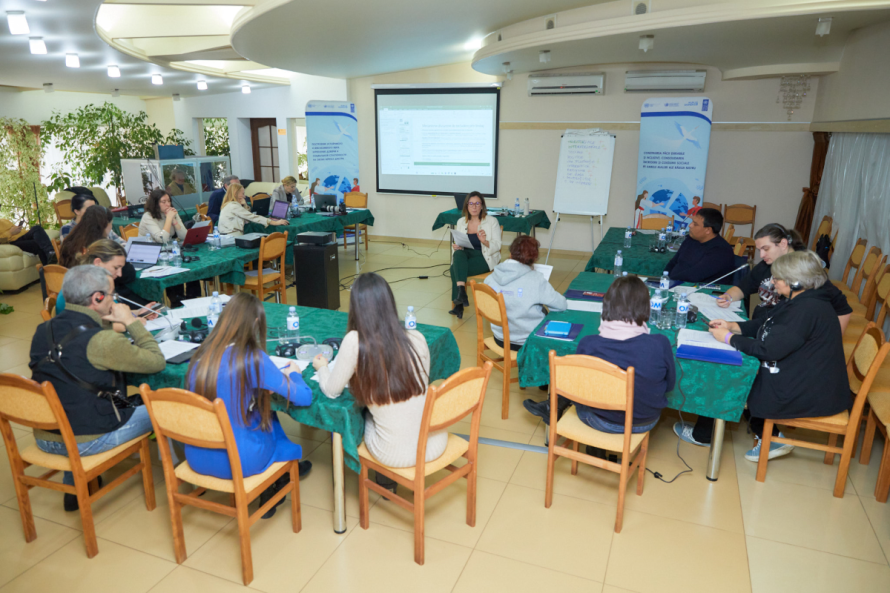back
Gender Equality and Conflict Reporting – for Professionals on Both Sides of Nistru River

Legend: Participants – involved in practical activities Photo: Aurel Obreja
Sixteen more media professionals and civic activists from all over the country, including from the left bank of Nistru River, strengthened their knowledge on accurate reporting of gender- and conflict–sensitive topics. The training session "Words that Matter: Strategies for Accurate Reporting of Gender- and Conflict–Sensitive Issues," similarly to the one in December 2023, are part of the "Media for Peace and Equality on Both Sides of Nistru" Program. The training conducted by UN Women and API took place on 24-25 January 2024 in one of the resorts in Vadul lui Vodă.
On the first day, trainers Loretta Handrabura and Ludmila Andronic spoke to participants about ensuring gender balance in media and public communication products and ethical issues in reporting different types of conflicts. The theme of women's and men's shared rights, opportunities and responsibilities, was of particular interest. "In our society, there are many gaps in providing equal opportunities for women. This, for example, concerns the refusal of employers to offer flexible working hours or the possibility of working remotely for women caring for children and/or people with disabilities, the lack of crèches in the workplace, etc. Opportunities should also be created in terms of logistics for women in the police, the army, including those on peacekeeping missions, etc. Ensuring gender equality in all public and private spheres is the shared responsibility of men and women, but here we still have plenty of problems," said gender expert Loretta Handrabura. She added that gender-sensitive media had an important role to play in changing people's perceptions, behaviour, but also social and cultural patterns and practices.
The second day of the training focused on the role of women in promoting peace, ensuring social balance to prevent conflict and in post-conflict situations. Communication expert Ludmila Andronic focused in particular on how to inform people correctly avoiding manipulation of public opinion, but also on how newsrooms should protect and ensure the security of employees during conflicts, protests, including from a gender-sensitive perspective.
The agenda included practical exercises, and participants were actively involved in identifying examples of gender stereotypes promoted in the media, analyzed several cases of correct and incorrect use of stereotypical images and language, stories about refugee women and others.
At the end of the two days, Iulia Terpan, Project Officer for Gender Equality in Peacebuilding of UN Women Moldova, handed out certificates of participation and mastering of the material presented at the training session to the beneficiaries of the program. In turn, the participants noted the usefulness of the training and made some wishes for the organizers.
"There have been situations where male bosses have put pressure on female employees and there have been attempts to intimidate them. In many cases, male colleagues showed an unfriendly attitude; they thought we were incapable of coping with professional demands. Now things have changed. In Călărași Police, the number of women and men is almost equal, and more and more women are being promoted to the leadership, trying to change these negative practices. After such trainings, we pass on the information to our teams, we discuss respect for gender equality and eliminate misunderstandings," said Elena Bădărău, an employee of Călărași Police Inspectorate.
"It is very good that in training we focused on what unites us, not what divides us. It was an excellent opportunity to have a friendly and constructive discussion on topical issues for the inhabitants of both sides of Nistru River, to exchange experiences and gain new knowledge," noted Tatiana Sergheeva, representative of Tiraspol-based Women Matter NGO.
"We have offered the opportunity to work remotely to the female employees of our newsroom who have young children. However, there are times when we have dilemmas, we don't have anyone to send out to do journalistic material. This training has helped me to understand the importance of concessions for the benefit of employees, how certain conflicts can be resolved, and this knowledge will help us to find the best solutions in the future," added Pancho Valchanov of Tainele Sănătății (Health Secrets) magazine.
"I have learned new things, which I will pass on to colleagues in my newsroom. It would be good to have guidelines on the rules for reporting gender equality and conflict in the media, to be distributed to newsrooms and journalists. We would also like to receive support to improve the editorial code of ethics, which should include regulations on correct coverage from a gender-sensitive perspective," said Inga Savca, from Tvn.md portal in Bălți.
The organizers reminded those present about the opportunity to participate in the open competition with prizes "Contribution of Media Professionals to Peace-building and Social Cohesion," launched last year by API and UN Women. The competition runs from 1 November 2023 to 10 June 2024. For its purpose, entry requirements and other details see HERE.
This activity is part of the program "Media for Peace and Equality on Both Banks of Nistru River," implemented by the Association of Independent Press (API) in the framework of the project "Building Sustainable and Inclusive Peace, Strengthening Trust and Social Cohesion on Both Banks of Nistru River," jointly implemented by the UN Human Rights Office (OHCHR), UN Women and UNDP, funded through the United Nations Peacebuilding Fund (UN PBF).